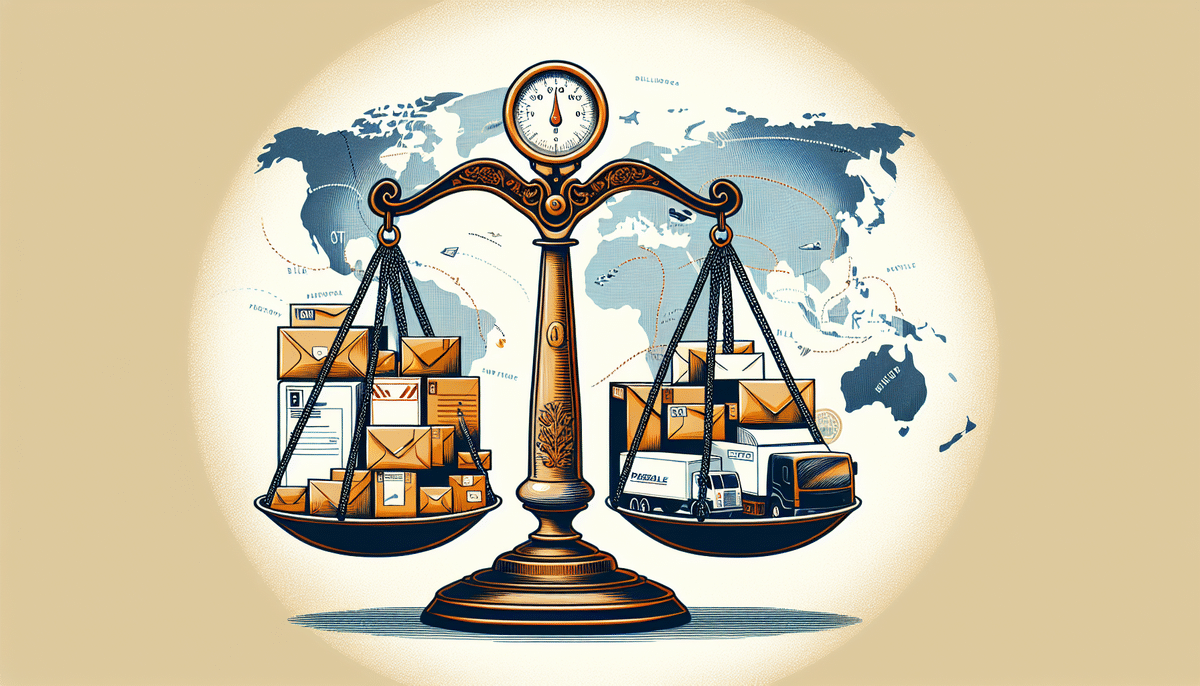Pitney Bowes vs FedEx: Comprehensive SEO Comparison for Your Business
Shipping is an essential component of any business operation, and selecting the right shipping provider can significantly impact your company's success. Two of the most prominent shipping providers in the market are Pitney Bowes and FedEx. This article provides an in-depth analysis of their services, pricing structures, customer service quality, sustainability initiatives, and future outlook to help you make an informed decision tailored to your business needs.
Company Overview and History
Pitney Bowes
Pitney Bowes is an American technology company founded in 1920 by Arthur Pitney and Walter Bowes. Initially renowned for developing the first commercial postage meter, Pitney Bowes has evolved into a global provider of shipping, mailing, and e-commerce solutions. As of 2023, the company employs approximately 16,000 individuals worldwide and serves businesses of all sizes, including small enterprises and large corporations.
FedEx
FedEx, established in 1971 by Frederick W. Smith, has grown into a global logistics powerhouse with over 650,000 employees serving more than 220 countries and territories. Known for its reliable courier, freight, and ground delivery services, FedEx continues to innovate within the logistics industry, leveraging technology to enhance its extensive network and customer offerings.
Services and Pricing
Services Offered
Pitney Bowes offers a comprehensive range of services, including parcel shipping, fulfillment services, data management, and advanced software solutions designed to streamline mailing and shipping processes. Additionally, Pitney Bowes provides financial services such as financing and leasing options for equipment and software, supporting businesses in managing cash flow and investing in necessary technologies.
FedEx provides a diverse array of shipping services, including express and ground delivery, freight and logistics solutions, and specialized e-commerce and retail shipping options. FedEx also offers printing and marketing services, aiding businesses in creating effective promotional materials alongside their logistics needs.
Pricing Structures
When it comes to pricing, both Pitney Bowes and FedEx offer flexible options tailored to different business needs. Pitney Bowes employs a volume-based pricing model, providing discounts for larger orders and regular shippers. Their SendPro C-Series program offers significant cost savings for businesses with high shipping volumes.
FedEx similarly offers tiered pricing structures, including discounts for bulk and recurrent shipments. Additionally, FedEx provides price matching guarantees, ensuring competitiveness by matching lower prices offered by competitors. Businesses can choose from various service levels to best fit their delivery timelines and budget constraints.
Technology and Innovation
Both companies are at the forefront of technological advancements in the shipping industry. Pitney Bowes integrates artificial intelligence, machine learning, and predictive analytics into its solutions, enabling businesses to optimize their supply chain operations and enhance efficiency.
FedEx invests heavily in cutting-edge technologies, such as autonomous delivery robots and drone delivery services, to expand its logistics capabilities. Their digital platform, FedEx Delivery Manager, empowers customers with greater control over their package deliveries and pickup schedules.
Delivery Speed and Reliability
Delivery speed and reliability are critical factors for businesses when selecting a shipping provider. FedEx excels in offering a wide range of delivery options, including same-day, next-day, and two-day deliveries, catering to time-sensitive shipments. Their extensive logistics network ensures prompt and dependable service across the globe.
Pitney Bowes offers reliable standard mailing and shipping services, particularly excelling in e-commerce solutions. While their delivery speed may not match FedEx's express options, Pitney Bowes provides consistent and dependable service for businesses focused on efficiency and cost-effectiveness in their shipping processes.
Customer Service Quality
Exceptional customer service is paramount in the shipping industry. Pitney Bowes offers multi-channel customer support, including email, phone, and live chat, staffed by knowledgeable representatives. Their user-friendly software and customer portals further enhance the user experience by providing easy access to shipping tools and resources.
FedEx is renowned for its robust customer service, available 24/7 through various communication channels. Dedicated customer service representatives assist with shipment inquiries, while their comprehensive online tracking system allows customers to monitor package locations and delivery statuses in real-time.
Sustainability Initiatives
With increasing emphasis on environmental responsibility, both Pitney Bowes and FedEx have implemented significant sustainability initiatives. FedEx has committed to reducing its carbon footprint through its "Reduce, Replace, Revolutionize" program, which includes the adoption of alternative fuels, electric vehicles, and investments in renewable energy sources. By 2030, FedEx aims to achieve carbon-neutral operations.
Pitney Bowes emphasizes sustainable shipping solutions, incorporating hybrid and electric vehicles into its fleet and utilizing eco-friendly materials in packaging. The company is dedicated to minimizing its environmental impact through energy-efficient practices and sustainable product development.
Pros and Cons
Pitney Bowes
- Pros:
- Cost-effective shipping solutions for small to mid-size businesses
- Comprehensive e-commerce and mailing solutions
- Strong customer support and user-friendly platforms
- Commitment to sustainability through eco-friendly initiatives
- Cons:
- Delivery speed options are limited compared to FedEx
- Less global coverage for international shipments
FedEx
- Pros:
- Extensive global logistics network
- Wide range of delivery speed options, including same-day service
- Advanced technology and innovative delivery solutions
- Robust customer service and real-time tracking
- Cons:
- Higher pricing for premium delivery services
- Complex pricing structures may be challenging for smaller businesses
Case Studies: Businesses Utilizing Pitney Bowes and FedEx
Business A: Leveraging FedEx for International Expansion
"We use FedEx for our international shipments, and the reliability has been unmatched. Our expansion into European markets was seamless thanks to FedEx's efficient delivery network and exceptional customer support," says the logistics manager of a growing e-commerce retailer.
Business B: Optimizing Costs with Pitney Bowes
"Since switching to Pitney Bowes for our shipping needs, we've seen significant cost savings and improved operational efficiency. Their integrated software solutions have streamlined our mailing processes, allowing us to focus more on our core business," reports the operations director of a mid-size manufacturing company.
Choosing the Right Provider: A Comprehensive Guide
Selecting between Pitney Bowes and FedEx depends on various factors specific to your business needs. Consider the following when making your decision:
- Pricing: Assess your shipping volume and frequency to determine which provider offers the most cost-effective solutions.
- Delivery Speed: If your business requires rapid delivery options, FedEx may be the better choice.
- Global Reach: For international shipping, FedEx's extensive network provides broader coverage.
- Technological Integration: Evaluate the software and technological tools each provider offers to support your operations.
- Sustainability Goals: Align your choice with your company's environmental commitments by considering each provider's sustainability initiatives.
- Customer Support: Ensure that the provider offers reliable and accessible customer service to address your shipping concerns promptly.
If uncertainty persists, consulting with a shipping expert or conducting a trial with both providers can offer valuable insights tailored to your specific requirements.
Future Outlook for the Shipping Industry
The shipping industry is undergoing rapid transformation driven by technological advancements and the explosive growth of e-commerce. Both Pitney Bowes and FedEx are strategically positioned to capitalize on these trends through continuous innovation and expansion of their service offerings. Emerging technologies such as automation, artificial intelligence, and sustainable energy solutions are expected to play pivotal roles in shaping the future of logistics.
As consumer expectations for faster and more reliable deliveries increase, both companies are investing in infrastructure and technology to meet these demands. Additionally, sustainability will remain a critical focus, with companies striving to reduce their environmental impact while maintaining operational efficiency.
Conclusion: Final Thoughts on Choosing Between Pitney Bowes and FedEx
Deciding between Pitney Bowes and FedEx ultimately hinges on your business's unique shipping needs and priorities. Both providers offer robust solutions with distinct advantages:
- Pitney Bowes: Best suited for small to mid-size businesses seeking cost-effective, comprehensive mailing and shipping solutions with strong customer support.
- FedEx: Ideal for businesses requiring fast, reliable shipping with extensive global reach and advanced technological integrations.
Evaluate your company's specific requirements in terms of pricing, delivery speed, global coverage, technology, sustainability, and customer service to make an informed decision. Consulting with a shipping expert or conducting pilot tests with both providers can further assist in selecting the optimal shipping partner for your business's success.






















